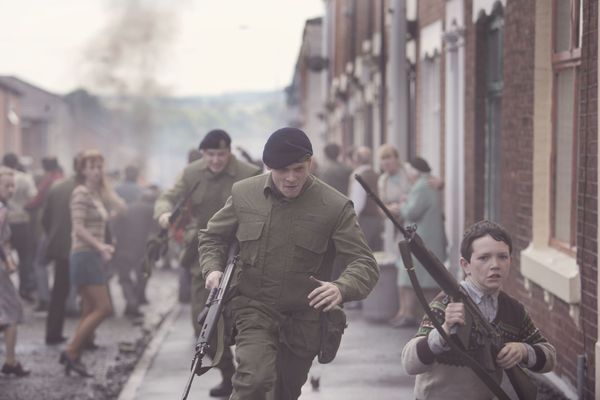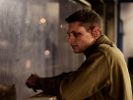Eye For Film >> Movies >> '71 (2014) Film Review

As Roger McGough once pointed out: "Old soldiers never die... Only young ones." And in Yann Demange's feature debut, some of the 'soldiers' portrayed against the backdrop of the Northern Ireland Troubles are so young they hardly realise they are fighting.
Black Watch playwright Gregory Burke invites us to spend a night at the 'hellmouth' that was Belfast Falls Road in 1971, as seen through the eyes of young British squaddie Gary Hook (Jack O'Connell) on his first tour of duty. An early indication of why young soldiers tend to die thanks to the old ones is shown when the upper-class commanding officer woefully misreads a situation and thrusts his wet-behind-the-ears company into a riot situation. It's not long before Hook finds himself with the survival chances of a fox in a beagle pen when he is left behind in the chaos. Firmly in the sights of a gaggle of provisionals, he is soon running for his life - a chase that will see him run pell-mell in to the shifting allegiances and collateral casualties of this internecine war.

Burke is interested in people not politics, keeping the focus on the sudden outbreaks of inhumanity and humanity in the madness, expertly crafting his thriller from the swirling fog of war, showing in particular how the hatred on any side of a conflict can become distilled and instilled in the young, so that it is as purely poisonous as it is senseless. Demange - and cinematographer Tat Radcliffe - match Burke's sharp script with taut action, steeping the night scenes in an orange glow that recalls faded polaroids of the period. The streets of Blackburn and high rises of Sheffield double for Belfast but Demange hunkers in, keeping within touching distance of Hook's naked fear. This is all about emotion - from the grunting punches heard against the blank screen in the film's opening moments - to the haunted look on Hook's face towards the end.
The young soldier isn't the only pawn in this game, with some thrust into the melee, while others seem to just get scooped along with it. Burke handles large amounts of characters with ease, sliding them, like a child Loyalist scally (Corey McKinley, small person/big impact) into the action smoothly so that they feel fully part of the fabric of the city. While Demange keeps his focus on faces, the lick of orange flames on a barricade or the skeleton of a burnt-out car are frequently glimpsed in the backdrop adding to the feeling of a place from which here is no escape.
The way Demange handles a bombing is particularly noteworthy. Instead of the usual bangs, turbulent camera and chaos of Hollywood, we see shellshocked Hook - our hearing, like his, muted - try to help in a scene that is surreal and stunned. This unusual handling extends to the characters, whether it is the generational tensions between the IRA factions or the Army's involvement 'on the street', with human unpredictability as important as each combatant's designated role. O'Connell acts almost as a silent witness, but his charisma in front of the camera is undeniable, steely determination glinting through the panic and pain just when you think he might be beaten. Burke and Demange - showing incredible maturity for first-timers in film - have worked hard to pare away any padding from their story and their success means it hits home hard.
Reviewed on: 03 Mar 2015
















